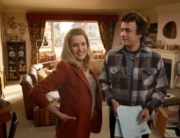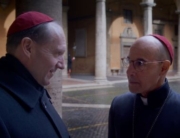
Having accompanied Meryl Streep’s imperious novelist-aunt on the Queen Mary II in Steven Soderbergh’s Let Them All Talk (2020), Lucas Hedges makes another transatlantic crossing with a larger-than-life relative in director Azazel Jacob’s latest feature (after 2017’s The Lovers). Adapted by Patrick deWitt from his 2018 novel, the film revolves around the complicated, codependent relationship between the self-absorbed Frances Price (Michelle Pfeiffer in an icy, brittle performance that gradually thaws and becomes poignant) and her passively resentful son, Malcolm (a shaggy Hedges), who can’t quite break free of his mother despite the best efforts of his fiancée Susan (Imogen Poots) to liberate him.
The wealthy Prices are broke. In the 12 years since her husband’s death (a scandal in New York high society because Frances found and abandoned the body to spend the weekend in Vail), she has spent all her fortune despite her financial advisor’s warnings to economize. “What were you planning?” he asks. “My plan,” Frances says wearily, “was to die before the money ran out, but I kept, and keep, not dying.” He advises her to sell all her remaining assets, and her friend Joan (Susan Coyne) offers the use of her Paris apartment.
Onboard the ship to France, Malcolm has a brief dalliance with Madeleine (a dryly comic Danielle Macdonald), a medium who recognizes Small Frank, the black cat accompanying mother and son, as the reincarnation of Frances’s late husband. “Don’t you know?” she asks the pair. “We know,” Frances bluntly replies.
In Paris, as the stacks of euros Frances has stored in her closet gradually dwindle, the isolated Prices accumulate new friends, starting with lonely widow Madame Reynard (a scene-stealing Valerie Mahaffey). After Small Frank runs away, private detective Julius (Isaach De Bankolé) is hired to track down Madeleine to help Frances communicate via séance with the missing feline (voiced by Tracy Letts). Eventually even Joan and Susan, accompanied by new boyfriend Tom (Daniel di Tomasso), show up at the apartment.
With the arrival of all these guests, the movie’s languid, melancholy tone, aided by Tobias Datum’s autumnal cinematography, shifts into an absurdist, stylized farce, reminiscent of a Wes Anderson fairy tale but minus the twee attitude. The score by Nick deWitt, Patrick’s older brother, lightens the air with a simple piano motif.
But the heart of the film remains focused on Frances and Malcom as the two finally start to really understand each other. “I didn’t know you were you,” Frances tenderly tells the son she and her husband had abandoned in boarding school, which she now regrets. As she gives away her last euros to homeless men in a park, the audience knows Frances is preparing to slip away without saying goodbye, making a French exit in her own way, but Jacobs and deWitt choose to let her final act remain ambiguous (unlike the novel). They end the film as it began, with Frances pulling a young Malcolm out of boarding school and driving off into the future.
It’s been quite a while since Pfeiffer has had such a meaty role, and even viewers annoyed by the movie’s stylistic quirks or Frances’s haughty attitude will savor this complex portrayal of a not always fathomable protagonist.
















Leave A Comment